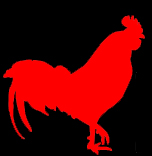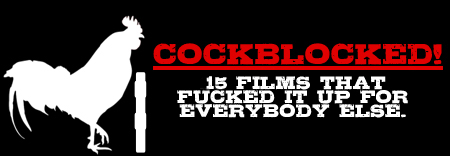
There’s a long history in Hollywood of shelved projects, abandoned franchise dreams, stalled careers, and entire genres that lost favor or profitability. 9 times out 10 these problems and failures are the result of a myriad of complex issues and contributing factors. Sometimes though… Sometimes you can pretty much pin everything on one film that fucked it up for everyone. Whether it’s a movie that killed a rival project, destroyed a filmmaker’s career, squashed some brilliant idea, or took the shine off of an entire genre, this CHUD List will catalog the films that were just total, unapologetic Cockblocks.
———-
———-
Day 2 (Halloween Anthology Cockblocked!)
Joshua Miller (Email • Facebook)
———-
 THE COCK: A Halloween anthology franchise.
THE COCK: A Halloween anthology franchise.
In 1981, John Carpenter and his producing/writing partner Debra Hill saw the future of the Halloween franchise, and it had nothing to do with a certain Shatner-mask wearing maniac named Michael. They envisioned a horror utopia, where every October there would be a new Halloween film, each telling a new unique story, connected with its predecessors only by the thematic device of being centered on or around All Hallows Eve.
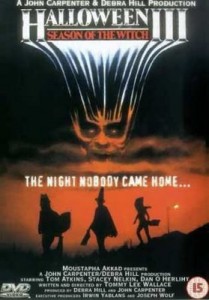 THE BLOCK: Halloween III: Season of the Witch (1982)
THE BLOCK: Halloween III: Season of the Witch (1982)
Tommy Lee Wallace’s anthology trial run starring RoboCop’s Dan O’Herlihy and genre stalwart Tom Atkins, about Stone Henge infused Halloween masks that turn your head into snakes and bugs. The film was a major commercial and critical disappointment, and even worse, it sent fans reeling with scorned rage over the absence of Michael Myers. So, after starting the Slasher boom in 1978, the Halloween franchise would now sit out the rest of the early 80’s Slasher Golden Age, until finally slinking back in 1988, tail between its legs and lesson learned, with Myers return.
How it Went Down:
Carpenter and Hill had little interest in doing a Halloween II, but the phenomenal success of the first film was not something to be ignored. Plus, Carpenter and Hill really stepped in shit (so to speak) when they – SPOILER ALERT ? – didn’t kill Michael Myers at the end of Halloween. The cosmos, both financially and creatively, screamed for a sequel. Now it was 1981, and Myers was safely dead. Carpenter and Hill were creatively ready to move on. Of course, Halloween II had been another box office success, so the powers that be wanted another sequel.
Halloween had nothing to do with the actual holiday of Halloween. It merely used the date as a backdrop. This afforded Carpenter and Hill with an interesting creative option. What if the series became an anthology, merely using the Halloween name as a branding tool?
Carpenter and Hill, flush with success at the moment, got the go-ahead. The first man they turned to was a lesser-known director named Joe Dante. Dante had burst onto the genre scene in 1978 with the surprise minor-hit Piranha, and was now generating some legitimate heat, having just had a cross-over success with The Howling. With Dante on board, Carpenter decided to jump outside the box and turned to British science fiction writer Nigel Kneale (best known for his Quatermass series) to pen the script. Kneale liked the idea of pulling the series away from the debased teenager stabfest Carpenter had stareted. Everything was in place for a potentially interesting new film, but the sweater began to unravel quickly.
Producing legend Dino De Laurentiis owned the film’s distribution rights, and he was not very keen on the tonal shift the franchise was suddenly taking. Kneale’s script was psychological horror, with a heavy dose of satire aimed at consumerism. Where was all the death?! Changes needed to be made, and Kneale did not want to make them; this wasn’t the film Carpenter had gotten him excited about. Compounding the slow creative implosion was Joe Dante’s departure from the project (it does not seem that he jumped ship for a specific other project, though soon after he was working on Spielberg’s Twilight Zone: The Movie).
Enter Tommy Lee Wallace. Wallace had been part of Carpenter’s art department since Carpenter’s epic student film, Dark Star, but this marked his first feature directing gig. With Kneale off the project (and later suing to have his name removed from the film), Wallace also took on the task of rewriting the script, adding Stone Henge and some robots and those all-important deaths. As is so often the case in such situations, Carpenter and Co. would probably would have been better served just throwing out Kneale’s script entirely, instead of trying to goose up the concepts and characters he already had in play. They wound up with a film that was kind of stuck between two different approaches, and thus only appealing to the very small segment of the filmgoing community who enjoy weirdness as its own virtue.
The film had a solid opening weekend, likely attended by young Halloween fans who didn’t read the trades or film reviews. But once word got out that Myers wasn’t in the film, Halloween III sank fast. It ultimately earned $14.4 million, off a $2.5 million budget. Not catastrophic, but it was significantly less than the first two films took in, and fans hated it. To this day it remains the second worst performing film in the franchise (with Halloween 5 coming in dead last with $11 million).
Bullet Dodged, or Greatness Robbed:
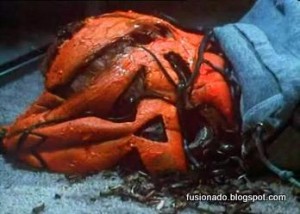
Halloween 4: The Return of Michael Myers only earned $17.7 million. This was 1988 and Freddy and Jason (plus an endless slew of imitators) had sucked every last drop of interest the average person had for Super Slashers from the market place. Michael had sat on the bench for too long. Nonetheless, I think it is interesting that Halloween 4, 5, and 6 all performed similar (or worse) to Halloween III.
Carpenter and Hill’s vision for the direction of the franchise was not a practical one, considering that Halloween II had already established that this was Michael Myers’ series. But their vision was a noble one, and I think in the long run, a smart one. Michael deservedly has his champions, but I have always found him to be the least effective of the Big Three Slashers, as far as utilization in his own franchise. While Jason was little more than a Michael knock-off, Jason’s backstory and motivations proved more mailable for a long-running series, whereas Michael’s backstory was promptly over-complicated and bungled when they brought him back for Halloween 4. Even if Michael had starred in Halloween III, the series likely would not have gone for more than three films.
Carpenter’s biggest mistake wasn’t dumping Michael, but offering up a weird subpar film that was surely to be rejected by hungry fans. (I know Halloween III has its cult of supporters, but objectively speaking, the film is a misfire by all reasonable standards.) In such a touchy scenario, Carpenter needed to deliver something great. This wasn’t just switching out the actor playing James Bond, or even switching out the villain (like Friday the 13th Part II did), Carpenter was trying to completely upend the series and change its basic format and tone. He needed a film that was at least comparably as strong as the first Halloween.
I think it would have been a far more interesting world for horror films if Carpenter and Hill’s Halloween anthology concept had been a success.
Verdict: Greatness Robbed.
The Alternate Universe:
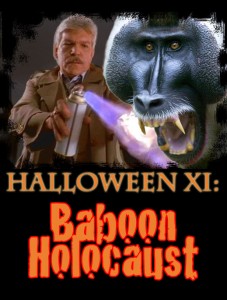
Joe Dante never leaves the project, and brings John Sayles in to retool Kneale’s script. Sayles finds clever ways to satisfy the powers that be without destroying Kneale’s script, and while Kneale isn’t happy to have been rewritten, he makes no attempts to have his name removed from the project. Dante then finds a way to infuse Sayles/Kneale’s weirdo script with the kind of spirit that early 80’s horror fans were looking for, while staying true to the script’s classier approach. Michael Myers fans still call bullshit, but the film brings in new fans who weren’t interested in Slasher films to begin with. More importantly, critics love the film, hailing Carpenter and Hill’s gimmick as a fun return to old Hollywood horror. While subsequent installments in the franchise vary wildly in quality, Halloween films become an institution that continues on into the 21st-century, even spawning a failed TV version that is little more than a Tales From the Crypt rip-off (and only lasts one season). Though helping launch the careers of many great directors, like Peter Jackson and Frank Darabont, the franchise begins sagging in the 90’s, until it hits a renaissance in 2001 when Quentin Tarantino helms an installment. Now hipper than ever, Halloween films become a sort of genre director badge of honor, and future installments are directed by everyone from Edgar Wright, to Alexander Aja, to George A. Romero, to Clive Barker, and even a surprise foray into horror by Wes Anderson.
Remains:
As much as I’d love to share an array of awesome killer dinosaur trading cards here…
If Carpenter and Hill ever had any ideas for a Halloween IV anthology film, they didn’t tell anyone. More than likely it was apparent early on with Season of the Witch that they had a potential turkey on their hands.
But some interesting fallout can be seen in the Friday the 13th franchise…
When all this was happening with Carpenter and Co., Friday creator/producer Sean S. Cunningham was in a similar camp (boom! pun!). He’d killed off the villain in his first film, then brought in the villain’s son for the second film, then killed him off too. He was out of relatives. But like Halloween, he had a title that was only ambiguously tied into the events of the films. Also, his villain switcheroo in the sequel had worked with fans. Now he too had been thinking about going anthology. When Halloween III shit the bed in a big way, Cunningham gave up that idea and decided to stick with what he had for a few more years. Even when Cunningham decided to do away with Jason in Friday the 13th Part V, he was not so foolish to lose the hockey mask and Slasher subgenre conventions (though fans cried bullshit nonetheless). But realistically, it would have been hard, if not impossible, for Friday to have blossomed and evolve as it did, if Michael Myers were still in the mix – likely evolving and blossoming in a fairly similar way. So, while Halloween III robbed Michael Myers fans of their icon’s full potential, Jason fans have the film to thank for theirs.
.
Background:
• Box office information for the franchise is available at Box Office Mojo.
• The rest I culled from a variety of web sources and common industry knowledge.
DISCUSS THIS on the CHUD Message Board
&
Like / Share it on Facebook (above or below) if you think it’s great!
